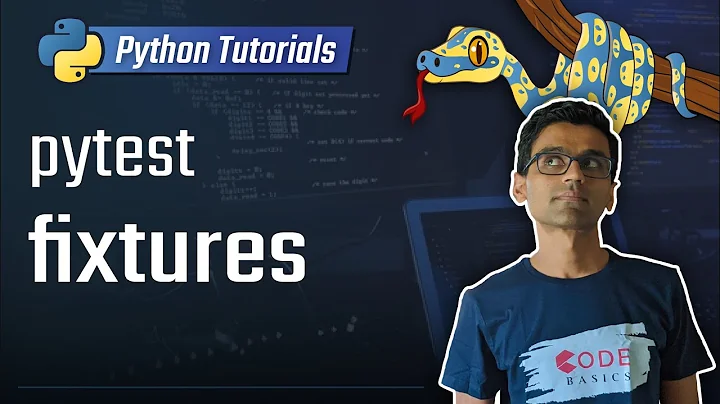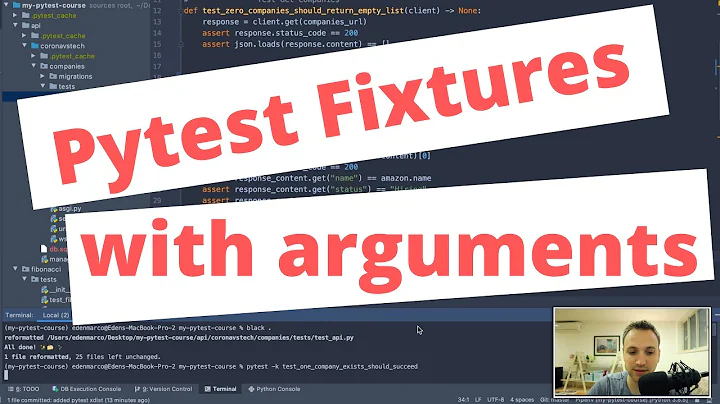Returning multiple objects from a pytest fixture
Solution 1
Yeah! probaly you will need two fixtures in this case..
you can try the @pytest.yield_fixture like :
@pytest.yield_fixture
def event():
...
yield <event_properties>
@pytest.yield_fixture
def listener(event):
...
yield <listener_properties>
Solution 2
Usually in order to avoid tuples and beautify your code, you can join them back together to one unit as a class, which has been done for you, using collections.namedtuple:
import collections
EventListener = collections.namedtuple('EventListener', 'event listener')
Now modify your fixture:
@pytest.fixture
def event_listener():
e = EventListener(EventEmitter(), Listener())
e.event.subscribe({'event' : [e.listener.operation]})
return e
Now modify your test:
def test_emitter(event_listener):
event_listener.event.emit('event')
assert event_listener.listener.result == 7
Solution 3
You should use a Python feature called iterable unpacking into variables.
def test_emitter(event):
lstr, ee = event # unpacking
ee.emit("event")
assert lstr.result == 7
Basically, you are assigning event[0] to lstr, and event[1] to ee. Using this feature is a very elegant way to avoid using indexes.
Discarding
In case you are going to use your fixture in mutiple tests, and you don't need all values in every test, you can also discard some elements of the iterable if you are not interested in using them as follows:
l = ['a', 'b', 'c', 'd']
a, b, c, d = l # unpacking all elements
a, _, c, d = l # discarding b
a, _, _, d = l # python 2: discard b and c
a, *_, d = l # python 3: discard b and c
a, _, _, _ = l # python2: discard, b, c and d
a, *_ = l # python3: discard b, c, and d
In theory, you are not literally discarding the values, but in Python _, so-called “I don’t care”, is used for ignoring the specific values.
Solution 4
If you can not afford to easily split your tuple fixture into two independent fixtures, you can now "unpack" a tuple or list fixture into other fixtures using my pytest-cases plugin as explained in this answer.
For your example that would look like:
from pytest_cases import pytest_fixture_plus
@pytest_fixture_plus(unpack_into="lstr,ee")
def event():
ee = EventEmitter()
lstr = Listener()
ee.subscribe({"event" : [lstr.operation]})
return lstr, ee
def test_emitter(lstr, ee):
ee.emit("event")
assert lstr.result == 7 # for example
Related videos on Youtube
Zallin
Updated on September 26, 2022Comments
-
Zallin over 1 year
I am learning how to use pytest by testing a simple event emitter implementation.
Basically, it looks like this
class EventEmitter(): def __init__(self): ... def subscribe(self, event_map): # adds listeners to provided in event_map events def emit(self, event, *args): # emits event with given argsFor convenience, I created a
Listenerclass that is used in testsclass Listener(): def __init__(self): ... def operation(self): # actual listenerCurrently, test looks the following way
@pytest.fixture def event(): ee = EventEmitter() lstr = Listener() ee.subscribe({"event" : [lstr.operation]}) return lstr, ee def test_emitter(event): lstr = event[0] ee = event[1] ee.emit("event") assert lstr.result == 7 # for exampleIn order to test event emitter, I need to check whether the inner state of the listener has changed after event propagation. Thus, I need two objects and I wonder if there is a better way to do this (maybe use two fixtures instead of one somehow) because this looks kinda ugly to me.
-
Zallin almost 8 years@jonrsharpe well I just did not know how to name this thing
-
 lmiguelvargasf almost 5 years@Zallin, I have added an answer to your question.
lmiguelvargasf almost 5 years@Zallin, I have added an answer to your question.
-
-
kiril about 7 yearsNote that this is now deprecated docs.pytest.org/en/latest/yieldfixture.html
-
Ted Elliott over 2 yearsOnly the yield_fixture decorator is deprecated. You can still yield from the fixture. Just replace \@pytest.yield_fixture with \@pytest.fixture if pytest > 3.0






